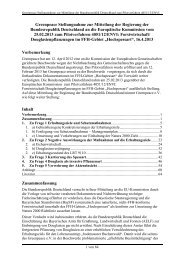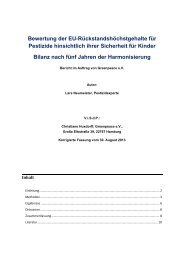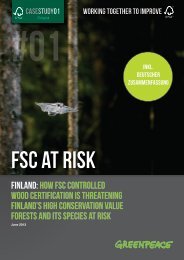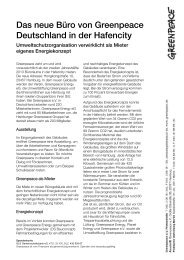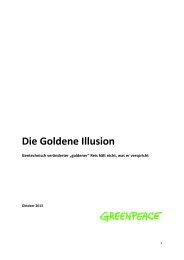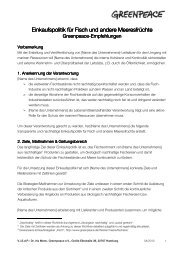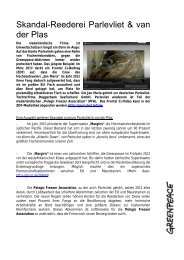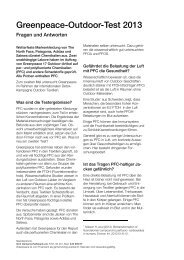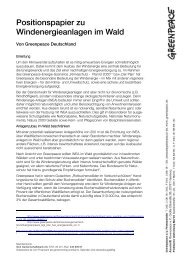Untitled - Greenpeace
Untitled - Greenpeace
Untitled - Greenpeace
Create successful ePaper yourself
Turn your PDF publications into a flip-book with our unique Google optimized e-Paper software.
CARVING UP THE CONGO<br />
19<br />
May 2002 –<br />
Moratorium on the issuing of new<br />
logging titles is imposed and<br />
immediately violated<br />
In May 2002, as part of negotiations over<br />
budgetary support, the World Bank persuades<br />
the transitional Government to impose a<br />
moratorium on the issuing of new logging<br />
titles. This is intended to allow time to review<br />
the legality of the logging contracts that<br />
remained after the initial April 2002 tax review<br />
and to complete all the legal decrees necessary<br />
to implement the new framework Forestry<br />
Code (see below), also developed under<br />
pressure from the Bank. 73<br />
On 14 May 2002, the Ministry of<br />
Environment issues a decree 74 suspending<br />
the allocation of new industrial logging<br />
titles 75 and the renewal or extension of<br />
existing ones, pending ‘the adoption of<br />
transparent allocation procedures’. 76<br />
However, the moratorium is violated almost<br />
immediately. New logging contracts for<br />
Soforma and CFT are signed on 31 May 2002<br />
– barely two weeks after the moratorium<br />
is imposed. 77<br />
August 2002 –<br />
The Forestry Code adopted<br />
Modelled on the Forestry Law that the World<br />
Bank developed for Cameroon in 1994, the<br />
Forestry Code is to be the principal legal tool<br />
for reform of the forestry sector in the DRC.<br />
As in Cameroon, the law is pushed through by<br />
the World Bank. The release of $15 million of<br />
budgetary support is made conditional on its<br />
adoption 78 and consequently law 11/2002 is<br />
adopted by the transitional Government of the<br />
DRC in August 2002, replacing the 1949<br />
colonial forestry regulations. The Forestry Code<br />
claims to make a key contribution to<br />
environmentally responsible and socially just<br />
development:<br />
©<strong>Greenpeace</strong>/Davison<br />
‘It is common knowledge that<br />
the revenues earned in the<br />
logging sector were shared<br />
directly by political elites and<br />
the loggers themselves with<br />
little concern for local<br />
populations or the<br />
environment. This continues<br />
to generate serious conflicts<br />
between stakeholders.’ 79<br />
Theodore Trefon, 2006



